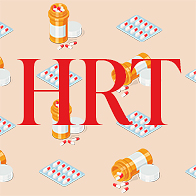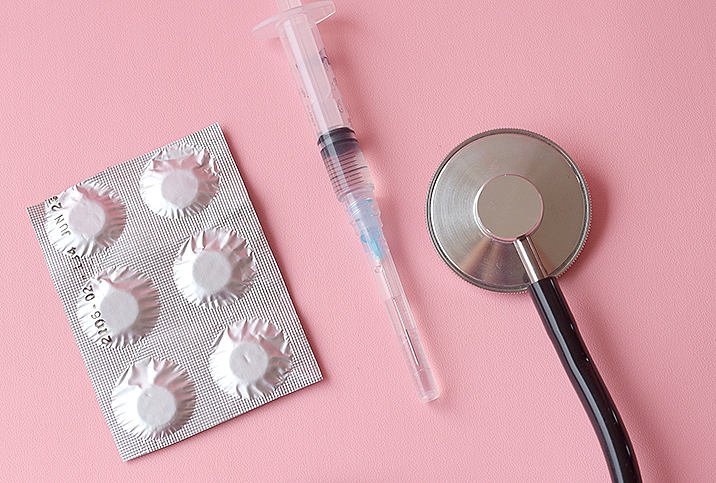HRT vs. Birth Control: Making the Switch During Perimenopause

Perimenopause is the transitionary period between fertility and menopause—typically beginning in a person's 40s or 50s, but sometimes as early as their mid-30s—which is marked by a 12-month absence of menstruation. During this time, the most difficult symptoms include hot flashes, trouble with sleep, brain fog, mood swings and depression, reduced sexual desire and decreased natural vaginal lubrication.
Birth control pills with estrogen are a standard prescription to prevent pregnancies that can still occur during perimenopause, and they represent a potent option to alleviate some symptoms caused by fluctuating hormones, such as:
- Regulating menstrual cycles
- Reducing bleed intensity and risk of anemia
- Taming uterine pain
- Lowering risks of ovarian and uterine cancer
- Supporting bone health
- Minimizing perimenopausal acne
Menopausal hormone therapy (MHT), also called hormone replacement therapy (HRT), is a second option. While it does not protect against pregnancy, it can help with hot flashes, night sweats and mild depression, and it supports bone health. Deciding between these two options comes down to your current health and personal needs.
Hormonal birth control vs. MHT
Birth control and hormone replacement therapy both act as hormone replacements that can be prescribed for perimenopause, however, the two have significant differences.
"Your doctor may suggest staying on birth control if you are still getting your period, your hormones aren't testing at postmenopausal levels, and you have not been diagnosed with premature ovarian failure or early menopause. Birth control can help if you are experiencing symptoms including hot flashes, acne, menstrual pain and bleeding, and irregular menstrual cycles," explained Kenosha Gleaton, M.D., a board-certified OB-GYN and medical advisor at Natalist, an online retailer of fertility and pregnancy products headquartered in Charleston, South Carolina.
HRT, on the other hand, is a treatment for women with low hormone levels. While some birth control methods, such as the pill, suppress the production of your hormones, it adds hormones to what you already have.
"HRT is often prescribed if you have tested at postmenopausal levels. HRT helps provide relief to immediate perimenopausal symptoms," Gleaton explained.
A wide range of hormone therapy options with varying dosages and forms, such as pills, patches and IUDs, provide flexibility.
Choose the option that meets your needs
If you still get your period or have had menstrual bleeding within the past 12 months, you could get pregnant. If you wish to avoid pregnancy, hormonal birth control is likely the best option. Another reason to choose hormonal birth control is if you still experience PMS, which can intensify during perimenopause.
Hormonal contraceptives are effective for controlling menstrual irregularity, heavy menstrual bleeding, hot flashes and night sweats. They also protect against the risk of ovarian, endometrial and colorectal cancer.
However, there are some risks to consider.
"Birth control pills have more oral estrogen than postmenopausal hormone replacement therapy and, therefore, have a higher blood clot risk. We also have higher blood clot risk as we get older," stated Monte Swarup, M.D., an OB-GYN in Chandler, Arizona, and founder of the community forum HPV Hub.
Other risks include a higher incidence of stroke in smokers and people who get migraines when taking the pill. Age is not a risk factor, however, and evidence to date suggests there is no increased risk of cardiovascular events or breast cancer for people in middle age compared with other age groups.
The Centers for Disease Control and Prevention (CDC) does not consider age a contraindication for hormonal birth control. Still, it's crucial you discuss the pros and cons with your doctor.
Some experts consider menopausal hormone therapy the first-line treatment for acute climacteric syndrome, which represents the anxiety, depression and mood disorders that can arise during the menopausal transition. MHT is also recommended for the prevention of long-term estrogen deficiency.
Administering low doses of estrogen vaginally is a preferred therapy for treating and preventing urogenital atrophy, which can cause an increased risk of urinary tract infections and pain with vaginal penetration.
When to make the switch
Making the switch from hormonal birth control to MHT is a personal decision best made with your healthcare provider on an individual basis. Continuing with birth control makes sense if you could still get pregnant.
"The need for contraception is generally gone at age 50 or can be ascertained by a blood test called an FSH. The result can help facilitate an earlier switch," Swarup said.
An FSH (follicle-stimulating hormone) test can determine whether a pregnancy is possible and reduce the 12-month waiting time to see if fertility has ended.
Experts believe the benefits of hormone therapy outweigh the risks for most people experiencing hot flashes, night sweats and other disturbances that interfere with quality of life. To discuss your options and weigh the pros and cons based on your specific health and needs, speak to your healthcare provider.




















